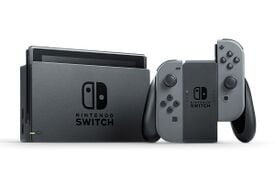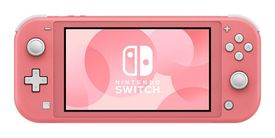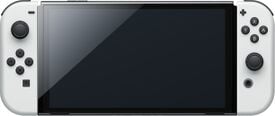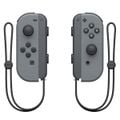Nintendo Switch
| Nintendo Switch | |
|---|---|

| |
| Manufacturer | Nintendo |
| Type | Hybrid video game console |
| Generation | Eighth generation era |
| First available | Worldwide: March 3, 2017 |
| CPU | Quad-core (4×ARM Cortex-A57) |
| GPU | Nvidia GM20B Maxwell |
| Media | ROM Cartridge Digital distribution (Nintendo eShop) |
| System storage | Internal flash memory: 32 GB (Base/Lite Model), 64 GB (OLED Model) microSD/microSDHC/microSDXC up to 2 TB |
| Controller input | Joy-Con Nintendo Switch Pro Controller Capacitive touchscreen GameCube controller (via an adapter) |
| Connectivity | 2.4/5 GHz 802.11ac Wi-Fi Bluetooth 4.1 1 × USB 3.0 (on dock) 2 × USB 2.0 (on dock) 1 × USB-C (on unit) |
| Online service | Nintendo Switch Online (Payment required) |
| Predecessor | Wii U |
| Successor | Nintendo Switch 2 |
| Article on Nintendo Wiki | Nintendo Switch |
- For the smasher, see Smasher:Switch.
The Nintendo Switch (ニンテンドースイッチ) is the seventh home video game console released by Nintendo. The console is the successor to the Wii U and it competes with Sony's PlayStation 4 and Microsoft's Xbox One console in the 8th generation of video game systems.
Known in development by its codename NX, it was unveiled in October 2016 via a YouTube promotion. It was then subsequently revealed as the Nintendo Switch in January 2017, and was released worldwide on March 3rd, 2017. The Switch is considered a "hybrid" console; it is designed primarily as a home console, with the main unit inserted onto a docking station to connect to a television or monitor. Alternatively, it can be removed from the dock and used similarly to a mobile tablet, or placed in a standalone tabletop position visible to several players. The Switch uses Joy-Con wireless controllers, which include standard buttons and a directional joystick for user input, motion sensing, and high-definition tactile feedback. Switch games and software are available on both physical flash ROM cartridges and digital distribution and do not use region locking.
In July 2018, a Switch revision was quietly released that had multiple components changed, in order to block multiple common hardware exploits, making it so that soft-modding is harder on these devices. Another revision, featuring a longer battery life than the original of 4.5–9 hours, was announced on July 17th, 2019, and was released in Japan and North America in mid-August 2019, and released in the United Kingdom in September 2019. This revision of the Switch primarily features the a change in both the main CPU and GPU that leads to lower power consumption while otherwise maintaining the same battery, which extends the battery life. The Nintendo Switch Lite, was announced on July 10th, 2019, and was released worldwide on September 20th, 2019. It is a handheld-focused revision of the system, integrating the Joy-Con as part of the main unit's hardware, and has a smaller screen and a larger battery capacity. Additionally, a regular directional pad replaced the four directional buttons on the integrated left Joy-Con. However, due to the integration of the Joy-Con into the system, they cannot be removed, and thus, the HD Rumble and IR camera features have been removed. The Switch Lite only directly supports games that can be played in handheld mode, retaining features like the Switch's gyroscopic sensors and Bluetooth, Wi-Fi, and NFC communication compatibility. Some tabletop games that require the HD Rumble or IR camera features will require players to use separate Joy-Con with the Switch Lite. The system does not support any docking or connectivity to a television, so it is incompatible with games that require television mode. Players who attempt to purchase games that require television or tabletop mode via the eShop on the Switch Lite will be notified of the incompatibility. In addition to other normal Joy-Con, the Switch Lite does support external controllers otherwise compatible with the Switch. A third model of the Nintendo Switch, the Nintendo Switch OLED Model, was announced on July 6th, 2021, and was released worldwide on October 8th, 2021. It features a 7 inches (180 mm) 720p OLED display, and when docked, output to 1080p resolution. Additionally, it features 64 GB of internal storage, enhanced audio functions, and includes a wider adjustable stand for use in tabletop mode. The unit ships with a new dock that includes a wired LAN port. Otherwise, it features similar technical specifications as the base Switch model, and is compatible with all Switch games and existing accessories. The unit ships in two bundles: one that includes a black dock and red and blue Joy-Con (similar to the base model's default color scheme), and a white dock with white Joy-Con.
The Nintendo Switch 2, the direct successor to the Nintendo Switch, was released on June 5, 2025.
As of December 31, 2025, the Nintendo Switch has sold 155.37 million units worldwide, making it Nintendo's best selling console as well as the second best selling video game console of all time, only surpassed by the PlayStation 2.[1]
Features[edit]
Hardware[edit]
The Switch console is solely based on the tablet. Everything else operates in tandem with the device. The Dock serves as a means to connect the tablet to a television, as well as charging it and any attached controllers. The console itself has 32 Gigabytes (64 Gigabytes in the OLED model) of on-system storage and has a slot for optional microSD card memory expansion of up to 2 Terabytes. The console is capable of 720p output in tablet and tabletop mode with an adaptive resolution and can go as high as 1080p while docked.
The Joy-Con controllers are wireless, Bluetooth-based and the right Joycon is equipped with an infrared camera on the bottom which allows gyroscopic data (among other things) to be surveyed to the Switch, allowing for Wiimote-like motion controls in various games. The Joy-Con can be used in tandem with each other in various ways. They can be equipped to a grip to make a whole controller, be held separately, or can be held horizontally and played as their own controllers. Additionally, a more traditional controller, called the Pro Controller, is also available, which also has built-in gyroscopic controls. All controllers feature HD Rumble, an advanced form of haptic feedback that enables the system to replicate every single tap and sensation in-game, with much more realism and efficiency than traditional haptic motors. The right control stick of every controller also contains an NFC reader chip, primarily used to scan amiibo.
The physical media for the console consists of proprietary cartridges as opposed to the optical Blu-Ray discs of its direct competitors. The cartridges are not region-locked, though they do require a profile on the console that matches the region the games were purchased in order to play them. The cartridge plastic has been coated in an extremely bitter, non-toxic substance to prevent children from swallowing them.
Online[edit]
The Switch initially launched with a free online service, with the promise of an improved, paid service later on in the system's lifespan. The new online system for the Switch named Nintendo Switch Online is a paid subscription-based online service based around the Nintendo Account service. It allows players all around the world to play with and against each other in games that have online multiplayer, have access to a library of retro games with Nintendo Classics (formerly Nintendo Switch Online classic game libraries[2]) all of which have added online play, save their data on a cloud backup system, have access to some otherwise paid content for free such as downloadable content, have access to the corresponding app on mobile devices, and have access to price reductions and exclusive demos on the Nintendo eShop (Switch-only).
For Nintendo Classics, it launched in 2018 with Nintendo Entertainment System (NES) games. More retro hardware were released throughout the years; Super Nintendo Entertainment System (SNES) in 2019 and Game Boy and Game Boy Color in 2023. Even more retro hardware were made available for subscribers of the Expansion Pack, an expanded tier of the service; Nintendo 64 and Sega Genesis/Sega Mega Drive in 2021, Game Boy Advance in 2023, and Virtual Boy slated to release in 2026.
Nintendo Switch App[edit]
The Nintendo Switch app (formerly Nintendo Switch Online app) is an application for mobile phones and tablets officially produced by Nintendo. An active Nintendo Switch Online subscription is required to utilize the services the app provides. Some sub-sections can appear in the app, corresponding to the owner-owned games.
Here is the list of all services:
- SplatNet 2: Allows players to access stats and notifications about events in Splatoon 2.
- Smash World: Allows player to upload, download and view Shared Content in Super Smash Bros. Ultimate.
- NookLink: Allows players to check in-game notifications and interact with friends in Animal Crossing: New Horizons, as well as transfer content from previous games.
- SplatNet 3: Allows players to access stats and notifications about events in Splatoon 3.
In the Super Smash Bros. series[edit]
Super Smash Bros. Ultimate was released for the Nintendo Switch on December 7th, 2018 worldwide. The game was first teased at the end of the March 8th, 2018 Nintendo Direct, little over a year after the system had launched, and was officially revealed at Nintendo's E3 2018 presentation.
Additionally, as DLC for Ultimate, four characters from games originally released for the console debuted in Smash as playable fighters: Byleth, Min Min, Pyra and Mythra. Debuting in 2019, Byleth currently stands as the most recently created fighter in the series.
In competitive play[edit]
Due to being the original hardware the game was designed for, the Switch is the preferred system to play Ultimate, especially in tournaments. While emulators exist, they sometimes possess bugs and performance issues not present on the Switch. However, riding on the momentum of work on previous systems, emulation developers have made great strides in making a nearly identical experience, with software like Yuzu rivaling original hardware in popularity due to ease of inserting mods and a smoother online experience.
Just like how it is possible to dump Switch cartridges and Micro SD card data onto other systems, some have found ways to make their own cartridges and Micro SD cards that work on original hardware and dump data from other systems onto them. This allows mods and fan-games to be played on original hardware, including some based on Ultimate. This scene is still relatively new and small compared to previous entries in the series, though cosmetic mods like texture packs have become plentiful in recent years.
Gallery[edit]
Trivia[edit]
- The Nintendo Switch is the fourth consecutive Nintendo console to have support for the GameCube controller, after the Wii U, Wii, and GameCube.
- The Switch is the first Nintendo home console and first Nintendo handheld since the DS Lite to lack region-locking.
References[edit]
- ^ IR Information:Dedicated Video Game Sales Unit. Nintendo. Retrieved on 2022-10-06.
- ^ https://www.nintendo.com/us/whatsnew/whats-new-with-nintendo-switch-online-on-nintendo-switch-2/
| Nintendo consoles | |
|---|---|
| Home consoles | Color TV-Game 15 · Nintendo Entertainment System · Super Nintendo Entertainment System · Virtual Boy · Nintendo 64 · Nintendo GameCube · Wii · Wii U |
| Handheld consoles | Game & Watch · Game Boy · Game Boy Color · Game Boy Advance · Nintendo DS · Nintendo 3DS |
| Hybrid consoles | Nintendo Switch · Nintendo Switch 2 |














